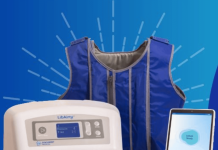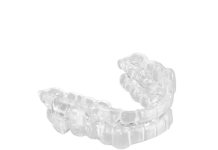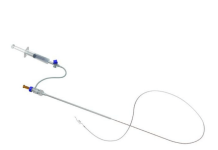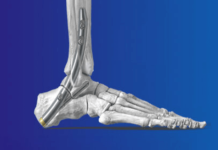Cardiovascular Systems, Inc. (CSI®) (NASDAQ: CSII), a medical device company developing and commercializing innovative interventional treatment systems for patients with peripheral and coronary artery disease, announced the first in-human experience with Propel™, its first-generation percutaneous ventricular assist device (pVAD), offering hemodynamic support for patients undergoing high-risk percutaneous coronary interventions (HR-PCI).
The first series of patients was treated by Dr. David E. Kandzari, MD, FACC, FSCAI, Chief, Piedmont Heart Institute and Cardiovascular Services, Atlanta, Ga., performed in Tbilisi, Georgia. Propel performed as intended, providing uninterrupted hemodynamic support leading to successful revascularization.
Propel is designed to meet the needs of the HR-PCI patient by providing clinically meaningful hemodynamic support while minimizing access site and procedural complications due to a small profile pump and smaller catheter body versus the current pVAD systems that are commercially available. Propel is percutaneously inserted, and the blood inlet portion of the device is positioned within the left ventricle below the aortic valve, and the outlet positioned above the aortic valve.
Propel was used at multiple support levels, with a hemodynamic power output and duration sufficient to maintain the stability of patients during their HR-PCI.
As one of the study investigators, Dr. Kandzari said, “This is a novel pVAD system that enables a 12 French in-body pump with a 7 French in-body catheter. This reduction in size may reduce the clinical complications associated with high-risk procedures while providing the clinically necessary cardiac support for the patient. The lower catheter profile may also increase the potential for use in patients with challenging anatomy that exclude treatment with current therapies.”
“Today’s announcement is another important milestone for CSI as we seek to develop an exciting pipeline of new products designed to improve the outcomes for patients with coronary artery disease,” said Scott R. Ward, Chairman, President and Chief Executive Officer of CSI. “We appreciate Dr. Kandzari’s commitment and willingness to participate in these first cases. Conducting the first in-human cases outside the U.S. increases the confidence we have in Propel and furthers the development of this program. We continue to work closely with FDA, and the data from these cases will inform the design and conduct of an early feasibility study in the U.S.”
About Coronary Artery Disease (CAD)
CAD is a life-threatening condition and a leading cause of death in men and women globally. CAD occurs when a fatty material called plaque builds up on the walls of arteries that supply blood to the heart. The plaque buildup causes the arteries to harden and narrow (atherosclerosis), reducing blood flow. The risk of CAD increases if a person has one or more of the following: high blood pressure, abnormal cholesterol levels, diabetes, or family history of early heart disease. According to the Centers for Disease Control and Prevention, 18 million people in the United States have CAD, the most common form of heart disease. Heart disease claims more than 650,000 lives in the United States each year. According to estimates, arterial calcium is present in 38 percent of patients undergoing a PCI. Significant calcium contributes to poor stent delivery, expansion and wall apposition leading to poor outcomes and higher treatment costs in coronary interventions when traditional therapies are used, including a significantly higher occurrence of death and major adverse cardiac events (MACE).
About Cardiovascular Systems, Inc.
Cardiovascular Systems, Inc., based in St. Paul, Minn., is a medical device company focused on developing and commercializing innovative solutions for treating vascular and coronary disease. The company’s orbital atherectomy system treats calcified and fibrotic plaque in arterial vessels throughout the leg and heart and addresses many of the limitations associated with existing surgical, catheter and pharmacological treatment alternatives. For additional information, please visit www.csi360.com and connect on Twitter @csi360.
Safe Harbor
Certain statements in this news release are forward-looking statements within the meaning of the Private Securities Litigation Reform Act of 1995 and are provided under the protection of the safe harbor for forward-looking statements provided by that Act. For example, statements in this press release regarding (i) the development of Propel; (ii) future clinical studies and regulatory submissions relating to Propel; and (iii) CSI’s product pipeline, are forward-looking statements. These statements involve risks and uncertainties that could cause results to differ materially from those projected, including, but not limited to, the ability of CSI to develop Propel; technical challenges; regulatory developments; clinical trial requirements and results; FDA clearances and approvals; the experience of physicians regarding the effectiveness and reliability of products sold by CSI; the reluctance of physicians, hospitals and other organizations to accept new products; the impact of competitive products and pricing; general economic conditions; and other factors detailed from time to time in CSI’s SEC reports, including its most recent annual report on Form 10-K and subsequent quarterly reports on Form 10-Q. CSI encourages you to consider all of these risks, uncertainties and other factors carefully in evaluating the forward-looking statements contained in this release. As a result of these matters, changes in facts, assumptions not being realized or other circumstances, CSI’s actual results may differ materially from the expected results discussed in the forward-looking statements contained in this release. The forward-looking statements made in this release are made only as of the date of this release, and CSI undertakes no obligation to update them to reflect subsequent events or circumstances.




